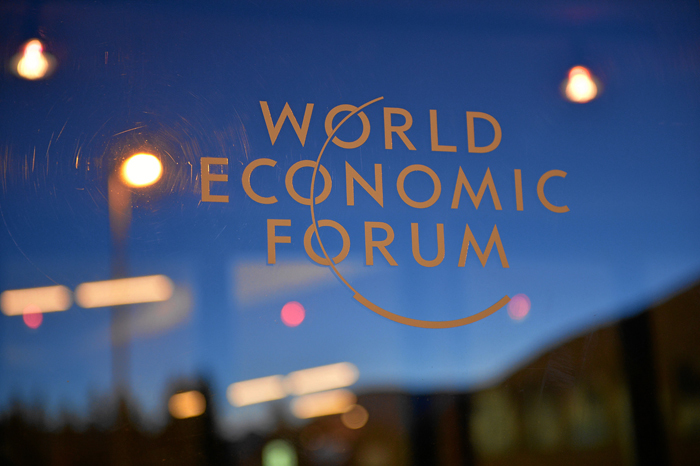Technology trends shaping higher education
25 March 2015
Data analytics, innovaton hubs and the future of graduate employment. These are the topics trending at higher education institutions worldwide. Monday Monthly writer Helen Swingler interviewed Vice-Chancellor Dr Max Price for his insights from this year's meeting of the Global Universities Leaders Forum (GULF) at the World Economic Forum.
GULF is a World Economic Forum initiative that brings together the leaders of 25 of the world's foremost universities, selected by WEF founder and executive chairperson Klaus Shwab.
Price has attended the meeting each year since 2010, along with leaders from Harvard, the Swiss Federal Institute of Technology in Lausanne, the London Business School, MIT and Columbia, who meet to discuss the trends that are shaping higher education worldwide.
The event is an opportunity to network with business and government leaders, global NGOs, and up–and–coming global leaders, Price says.
"It's also an opportunity to fly the flag for universities in Africa – UCT was the only African university represented – and for UCT, which is important for our own politicians and corporate leaders to see."
Global trend think tank
Interspersed with economic and geopolitical trend analyses, the regular WEF programme has a programme of scientific workshops and panels to identify future technology trends that will affect business, governments and society.
This year, these trends were robotics, neuroscience, synthetic biology, energy policy and carbon, food security, and big data.
"All of these have implications for thinking about the kinds of jobs our graduates will have in ten to twenty years' time, and therefore should influence our thinking about curricula," Price says.
"They also influence our thinking about steering institutional research strategy. Some of these topics may appear a bit narrow and mainly of curiosity value; so let me take just one example – robotics – to illustrate the value of such discussions.
"The focus on driverless cars highlights the growing confidence in robots to do complex technical jobs – including piloting everything from autonomous vehicles to machinery – better, and with fewer mistakes, than humans. In ten years, it was stated, most traditional manufacturing jobs will no longer exist."
The implications are wide–ranging, and will affect economies, employment, skills mixes, and importantly for universities, graduate competencies.
"For developing countries, the speed, quality of performance, and ultimately the lower costs of production that result from robot use will make even our relatively low–cost labour economies uncompetitive.
"So we have to get into the field of robotics ourselves if we want to compete. New jobs will eventually be created, but there will probably be a lag. Entrepreneurship is seen as the major area of job creation, and universities need to take this far more seriously as a skill all graduates should probably have."
Even more crucial to UCT, and at the heart of Price's annual pilgrimage to Davos, was the one–day GULF meeting, at which the 25 university presidents and vice–chancellors shared their experiences and reflected; a high–level dialogue on the broader trends expected that will shape higher education.
This year, there were three main topics on the GULF agenda.
Data analysis skills vital
First, the digital future, and the need for data analytics.
"This was a discussion with Eric Schmidt, founder and chairperson of Google, who highlighted the exponential demand for data scientists. His view is that 70 to 80% of all jobs in the near future will require some familiarity with data science. From next year, all UC Berkeley fouryear undergraduates will be required to include a course on data analytics – different courses depending on an individual's facility with calculus."
Innovation hubs
The second topic was facilitating innovation, and particularly innovation hubs, science parks and similar facilities.
"MIT's Lincoln Laboratories and the Singapore Research Campus were presented as successful examples of government–sponsored university business research and development centres – with the Singapore Park open to partnerships with universities from around the world," says Price.
"The discussion covered issues of intellectual property protection versus very liberal regimes; collaboration with business and government; benefits of small start–ups versus big industry collaboration; access to risk capital and other barriers to innovation. One particularly interesting initiative, driven by the US National Science Foundation, is I–Corps, access to which we are exploring for UCT."
Global recruiters
The third topic was the future of graduate employment.
Presenting was the CEO of a global labour broker company called ManpowerGroup, which primarily places graduates. Labour broking is significantly shifting up the skill ladder to highly skilled and professional graduates.
Price said Manpower employs 3.5 million graduates from 81 countries around the world, mainly under 34 years of age, who are placed with companies that need specialist skills. More than 40% that come through Manpower will end up being employed by the companies to which they are deployed.
While the practice "presumably improves efficiencies and flexibility for employers and the global labour marketplace", the implications for universities were profound, Price pointed out.
"This changing mode of employment, lack of job security, shifting or absent employer allegiance, and arguably ruthless attitude of employing people only for as long as you need them, is forcing universities to think about how to prepare graduates better for this sort of marketplace."
Sustainable campuses
As sustainability is a key imperative, all GULF members have committed to on–campus programmes to improve the environment and promote sustainability.
"We each submit a report to GULF prior to the meeting, and the WEF secretariat compiles a booklet of innovative practices at different universities. UCT featured two pages of innovative practices in the compilation."

In addition to the main annual meeting in Davos, the World Economic Forum holds regional fora in various parts of the globe. This year marks World Economic Forum Africa's 25th anniversary.
WEF Africa takes place in Cape Town every alternate year. Last year it was in Abuja, Nigeria, and this year it will be hosted in the Mother City from 3 to 5 June.
The theme is 'Then and Now: Reimagining Africa's Future'.
It's a significant milestone, as 2015 marks the end of the region's combined efforts to reach the United Nations Millennium Development Goals to eradicate poverty. Africa has a GDP outstripped by the world average by two to three percent, and the world's biggest youth population. According to WEF Africa, its working–age population is expected to double to 1 billion in the next 25 years.
This year WEF Africa will convene regional and global leaders to take stock of progress over the last 25 years, and identify innovative approaches to inclusive growth and sustainable development in the future. And it's at this level that UCT's leading researchers will provide input.
Post–2015 Development Agenda
One of the overarching WEF themes this year was the Millennium Development Goals, timebound targets set by the United Nations that are due to expire this year, after 2015.
"It's likely that these goals will now be called Sustainability Development Goals," says Price.
"There was considerable discussion at WEF about sustainability, particularly food security.
"But it's not just about goals; much of the discussion was also about strategy, and a key theme is moving away from placing people in 'good' and 'bad' categories. Instead, the focus is moving towards co–operation and partnership, moving from 'name and blame' to 'know and show' strategies to find better ways of dealing with sustainability."
Price said discussions at the WEF indicated a tipping point in the world, with a growing number of large companies and chiefs committed to issues of sustainability, and increasingly willing to take these on unilaterally, without waiting for government to lead.
Another discussion focused on how universities deal with intellectual property rights, and the trade–off between fostering innovation by student and staff inventors, and smothering it because of restrictions safeguarding the institution's investment.
"These are the kinds of discussions we want to ensure our academics are part of." For Price, the value of attending WEF hinges on this aspect.
For example, startling progress in the field of neuroscience (UCT itself will soon be launching a new clinical neuroscience centre) will require new academic structures, curricula, degree structures and funding mechanisms to facilitate this cross–disciplinary field.
"Exposure to these high–levels discussions changes the way I think about the organisation of the university and its departments, research programmes and their funding, and the overall curricula design to facilitate these developments. This is to provide the environment that will ensure the science will advance.
"In the end, this is what providing leadership in a university is about."
Story by Helen Swingler. Image of spot welding being done by industrial robots courtesy of the BMW plant in Leipzig, accessed under the Creative Commons licence via Wikipedia.
 This work is licensed under a Creative Commons Attribution-NoDerivatives 4.0 International License.
This work is licensed under a Creative Commons Attribution-NoDerivatives 4.0 International License.
Please view the republishing articles page for more information.
Feature
Faculty Focus - Law
Editorial
Photo Essay
Front page
Previous Editions










